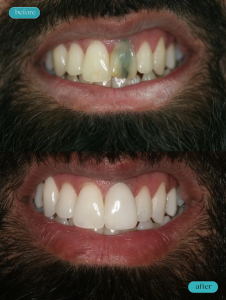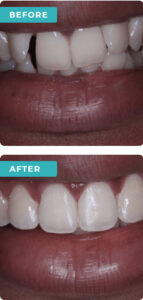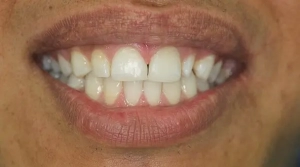
In this guide, we will discuss how the composite bonding treatment works, why it’s good for existing dental work, and the positive changes you can expect to your smile. Our Birmingham-based team is here to make your smile dreams a reality.
Whether you’re new to the idea of composite bonding or thinking about tweaking your current dental situation, this guide will help.
COMPOSITE BONDING CONSULTATION
What Is Composite Bonding?
 Composite bonding treatment, also known as dental bonding, is a cosmetic dental treatment that uses tooth-coloured composite resin to improve the appearance of teeth. It offers a solution for minor damage, such as filling chips, fractures, or gaps between teeth, and for fixing discolouration.
Composite bonding treatment, also known as dental bonding, is a cosmetic dental treatment that uses tooth-coloured composite resin to improve the appearance of teeth. It offers a solution for minor damage, such as filling chips, fractures, or gaps between teeth, and for fixing discolouration.
Here at Manor House Dental, we have an excellent team that is keen to guide you in your composite bonding journey. We have the skill to deal with, composite bonding for gaps, composite bonding for discoloured teeth and composite bonding for chipped teeth.
If you require a composite bonding dentist in Birmingham or surrounding areas, contact Manor House Dental today for your composite bonding consultation. You can visit our smile gallery to see our wealth of success stories.
COMPOSITE BONDING CONSULTATION
Composite Bonding Treatment Options
- Cosmetic Bonding
Cosmetic bonding is a popular treatment for minor fixes like chipped or discoloured teeth. It involves applying a tooth-coloured composite resin to the affected area and skillfully blending it with your natural teeth. This type is excellent for subtle yet impactful improvements.
- Veneer Bonding
Veneer bonding takes things a step further, especially when dealing with more extensive cosmetic concerns. Thin shells of composite material are custom-made and applied to the front surface of your teeth, covering imperfections and creating a uniform appearance. It’s like giving your teeth a new, flawless facade.
- Edge Bonding
Edge bonding is perfect for addressing worn or uneven tooth edges, edge bonding focuses on enhancing the contour and symmetry of your teeth. By applying composite resin to the edges, our skilled dental team at Manor House Dental can reshape and redefine your smile for a more polished look.
- Inlay/Onlay Bonding
Inlays and onlays are recommended when dealing with larger areas of decay or damage, inlay/onlay bonding comes into play. These custom-made pieces of composite material are precisely fitted into or onto the affected area, restoring the tooth’s structure while maintaining a natural appearance. It’s a durable solution for more extensive dental work.
COMPOSITE BONDING CONSULTATION
Why Composite Bonding Is Beneficial

Here are several reasons why composite bonding treatment is a preferable choice for many patients:
Achieve a Healthier and More Confident Smile
This treatment significantly enhances the aesthetic appeal of your smile through a composite bonding smile makeover.
Safe and Swift Treatment
Typically completed in one or two visits, this treatment ensures instant results with a safe and speedy process.
Needle-Free Experience
Say goodbye to worries about injections. In most cases, needles are not required for composite bonding.
Cost-Effective Option
Composite bonding stands out as an affordable alternative to some other available treatments. It’s worth noting that ongoing maintenance should always be considered.
If you’re eager to learn more about this or wish to schedule an appointment with our dental experts, feel free to reach out to us now if you need emergency composite bonding.
COMPOSITE BONDING CONSULTATION
The Cost of Composite Bonding

A composite bonding in Birmingham typically costs around £150 per tooth. For more information about our composite bonding costs in Birmingham, please visit our detailed fees page.
If you need more information or wish to schedule a composite bonding consultation, please don’t hesitate to contact Manor House Dental.
Composite Bonding Procedure
Treatments usually takes less than 1 hour, can be carried out in one appointment and there is no damage to your teeth. Local anaesthetic is usually only needed if dental bonding is being used to fill a tooth with a cavity. The dentist will choose a bonding colour that matches the patient’s teeth making it nearly impossible to tell it is not your tooth.
Firstly, your dentist will use a shade guide to choose a colour of composite that closely matches your natural teeth. If you wish to whiten your teeth before having Dental bonding the dentist will arrange this for you. Your dentist will roughen the surface of the tooth, and then apply a liquid that allows the bonding agent to stick to the tooth.
Your dentist will apply the composite resin over the liquid and then harden the material with visible blue light. If necessary, your dentist can further shape the tooth after the resin hardens.
Composite Bonding Aftercare

After the procedure, it is important to avoid habits such as biting fingernails, chewing pens or using your teeth to tear things open as this could cause your Dental Bondings to chip. If your teeth feel sharp after Dental Bonding treatment it is important to tell your dentist so that they can assess what needs to be done.
Follow good oral hygiene practices after your composite bonding treatment – remember to brush your teeth for two minutes twice a day, floss, use mouthwash once or twice a day and keep appointments as advised by your dentist.
Contact Manor House Dental today to book an appointment for composite bonding treatment.



